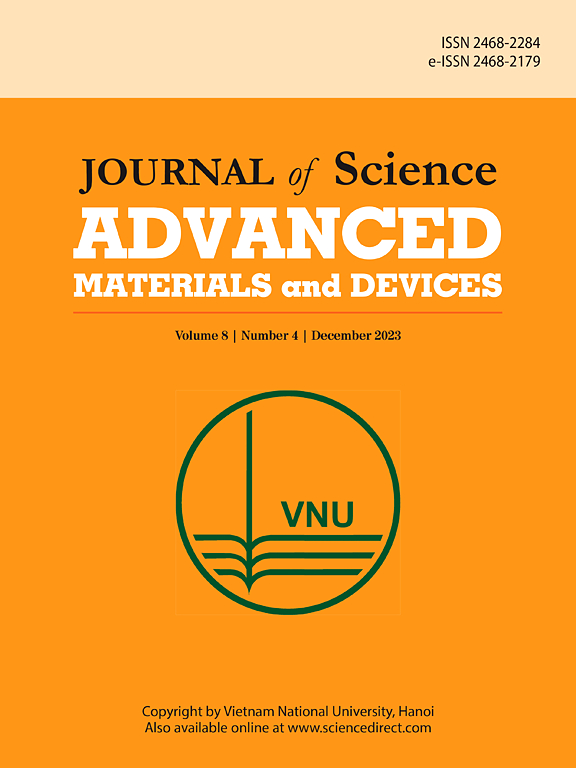用于未来电力电子应用的 LG = 50 nm T 门控和掺 Fe 双量子阱氮化镓-HEMT,基于碳化硅晶圆和分级氮化镓势垒
IF 6.7
3区 材料科学
Q1 MATERIALS SCIENCE, MULTIDISCIPLINARY
Journal of Science: Advanced Materials and Devices
Pub Date : 2024-10-11
DOI:10.1016/j.jsamd.2024.100795
引用次数: 0
摘要
设计并研究了具有 AlN 顶部势垒、凹陷 T 形栅极和渐变 AlGaN 底部势垒的高性能 LG = 50 nm 渐变双通道 (GDC) -HEMT。在碳化硅衬底上开发的 AlN-GaN 分级 AlGaN-GaN 多层结构中形成了两个量子阱,其跨导 (GM)、截止频率 (fT) 和电容图的明显双驼峰特征清楚地说明了双通道 (DC) 行为。为探索势垒厚度(AlNamp 和分级 AlGaN)的影响而进行的研究显示,GM 在 181.5 和 488.1 mS/mm 处显示出两个峰值,VGS 偏压为 3 V 时的峰值驱动电流(ID_peak)为 1.81 A/mm,最大饱和漏极电流为 3.08 A/mm(VGS = 3 V)。08 A/mm (VGS = 3V),而当两个势垒都为 6 nm 薄时,从左驼峰和右驼峰得出的 fT 分别为 263.7 GHz & 354.2 GHz,这归因于通道的协调性和较低的漏电,从而提高了 2DEG 密度。我们注意到,当底部势垒较厚时,由于栅极进入下部沟道的通道不足,直流行为不太明显。我们研究了改变 AlGaN 顶部势垒中的铝含量对 GDC-HEMT 的直流/射频性能的影响,结果表明,随着铝含量的增加,特别是 Al0.35Ga0.65N 的铝含量增加,其性能会有所提高。通过使用各种金属,本研究还探讨了栅极工程如何影响 GDC-HEMT 的电气特性。铝栅极的jm(功函数)越低,直流/射频性能越好。当肖特基势垒因导带边缘升高而上升时,性能就会降低,阈值电压 (Vth) 就会升高。由于理解源极电阻(Rs)和漏极电阻(Rd)在射频设计中的作用至关重要,我们还通过改变源极-栅极间隙(LGS)和漏极-栅极间隙(LGD)进行了模拟。由于 Rs & Rd 较低,我们确定 GDC-HEMT 在最小的 LGS & LGD 时性能更好。非凡的性能有力地证明了 GDC-HEMT 在未来宽带功率放大器中的巨大潜力和适用性。本文章由计算机程序翻译,如有差异,请以英文原文为准。
LG = 50 nm T-gated and Fe-doped double quantum well GaN‒HEMT on SiC wafer with graded AlGaN barrier for future power electronics applications
High-performance LG = 50 nm graded double-channel (GDC)-HEMT featuring AlN top barrier, recessed T-gate and graded-AlGaN bottom barrier is designed and investigated. Two quantum wells are formed in the AlN-GaN-graded AlGaN-GaN multilayer structure developed on a SiC substrate and the clear double hump feature of the transconductance (GM), cut-off frequency (fT), and capacitance plots clearly illustrates the double-channel (DC) behavior. The investigations carried out to explore the impact of barrier thickness (both AlN & graded-AlGaN) revealed superior performance with the GM showing two peaks at 181.5 & 488.1 mS/mm, the peak-drive-current (ID_peak) with VGS biased at 3 V is 1.81 A/mm, maximum saturation drain current of 3.08 A/mm (VGS = 3V), and the fT derived from the left- and right-hump are 263.7 GHz & 354.2 GHz, respectively, when both barriers are 6 nm thin, attributable to enhanced 2DEG density due to the coordination of channels because of proximity and lower leakage. It has been noticed that when the bottom barrier is thick, the DC behaviour is less obvious due to insufficient gate access to the lower channel. We investigated the impact of varying the Al % in AlGaN top barrier on the DC/RF performance of GDC-HEMTs, demonstrating enhanced performance with increased Al content, particularly for Al0.35Ga0.65N. By using various metals, this study also investigates how gate engineering affects the electrical characteristics of the GDC-HEMT. The lower ϕm (work function) of the Al-gate led to better DC/RF performance. When the Schottky barrier rises as a result of the conduction band edge being elevated, the performance reduces, and the threshold voltage (Vth) increases. Since it is essential to comprehend the role that source resistance (Rs) & drain resistance (Rd) play in RF design, we have also conducted simulations by varying the source-gate gap (LGS) & drain-gate gap (LGD). Due to low Rs & Rd, it was determined that the GDC-HEMT performed better at the smallest LGS & LGD. The extraordinary performance strongly highlights the immense potential and applicability of the GDC-HEMTs for future broadband power amplifiers.
求助全文
通过发布文献求助,成功后即可免费获取论文全文。
去求助
来源期刊

Journal of Science: Advanced Materials and Devices
Materials Science-Electronic, Optical and Magnetic Materials
CiteScore
11.90
自引率
2.50%
发文量
88
审稿时长
47 days
期刊介绍:
In 1985, the Journal of Science was founded as a platform for publishing national and international research papers across various disciplines, including natural sciences, technology, social sciences, and humanities. Over the years, the journal has experienced remarkable growth in terms of quality, size, and scope. Today, it encompasses a diverse range of publications dedicated to academic research.
Considering the rapid expansion of materials science, we are pleased to introduce the Journal of Science: Advanced Materials and Devices. This new addition to our journal series offers researchers an exciting opportunity to publish their work on all aspects of materials science and technology within the esteemed Journal of Science.
With this development, we aim to revolutionize the way research in materials science is expressed and organized, further strengthening our commitment to promoting outstanding research across various scientific and technological fields.
 求助内容:
求助内容: 应助结果提醒方式:
应助结果提醒方式:


